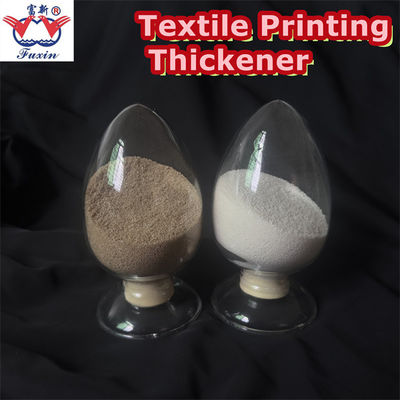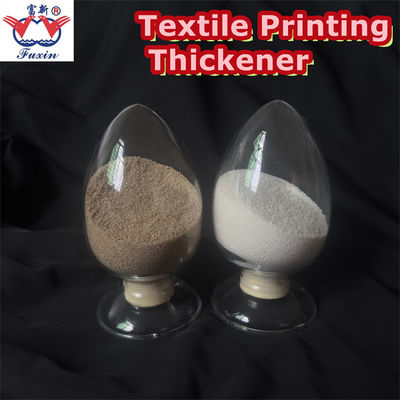Product Description:
Textile Printing Thickener is an indispensable product used in the textile industry. It aims to increase the viscosity and thickness of printing pastes or inks. This is to ensure a more controlled flow and distribution of the printing material when applied to the fabric, resulting in better print clarity and quality.
It is widely recognized for its ability to improve the quality of prints on the cloth surface. Furthermore, it will help conserve large amounts of ink and other printing material which can be quite costly.
Features:
The Benefits of Using a Non-Sodium Alginate Printing Paste
Using a non-sodium alginate printing paste offers several benefits in comparison to its potential alternatives. For one, it can lead to a higher color yield of anywhere from 10-20% in comparison to sodium alginate. This higher yield can directly reduce dye consumption costs and, thus, contribute to any businesses' bottom line. Additionally, this type of printing paste benefits from a greater chemical stability and compatibility with printing and dyeing auxiliaries and dyes. This ensures that they are less likely to spoil stored over extended periods of time, meaning that there is no need to add additional preservatives as may be required with sodium alginate.
Furthermore, this type of printing paste also offers good water retention and a high structural viscosity. This allows for a shear thinning performance that enables for an excellent screen penetration performance and high outline definition. As a result, lines are able to be printed smoothly and with a higher definition. Additionally, this type of paste offers easy solubility, with the potential to be quickly dissolved in cold water under stirring conditions without forming clumps. Not only is this convenient, it can also help to save time due to the lack of any need for Beating.
Finally, this printing paste has the added benefits of being easy to wash off with good hand feeling. Thus, it is both convenient and comfortable. Overall, its cost-effectiveness is arguably its most attractive feature, as its utilization can help to improve economic benefits by reducing the use costs.
Technical Parameters:
Specification
| TYPE |
Degree of Substitution (DS) |
Viscosity
(Brookfield,1%soln.,20℃)
|
pH |
Moisture |
Particle Size |
| 10H |
1 |
2500-3000cps |
6.5-8.5 |
≤15% |
20-70 mesh |
| 13H |
1.3 |
1500-2500cps |
| 15H |
1.5 |
1000-2000cps |
| 18H |
1.8 |
800-1600cps |
| Y002 |
2 |
800-1500cps |
| Y230 |
2.3 |
600-1000cps |
*Kindly contact us for specification and information about any specific grade of CMC other than mentioned in the above table.
Powder or granular available, we recomed customer to purchase the brown granle type CMC to sell as sodium alginate for higher profit.
Applications:
Pigment Printing
Textile Printing Thickener is utilized to thicken pigment pastes, which are then applied onto the fabric surface. This helps in preventing bleeding or spreading of the pigment, resulting in sharp and well-defined prints.
Reactive Printing
Reactive dyes are commonly used for printing intricate designs on textiles. The Textile Printing Thickener is employed to thicken the dye solution, allowing for better control over the dye penetration and fixation onto the fabric. This ensures clear and vibrant prints with excellent color fastness.
Discharge Printing
Discharge printing involves the removal of color from pre-dyed fabrics to create intricate designs. The Textile Printing Thickener is used to thicken the discharge paste, which helps in controlling the removal process and achieving precise patterns or motifs.
Resist Printing
In resist printing, a resist agent is applied to specific areas of the fabric to prevent dye penetration. The Textile Printing Thickener is used to thicken the resist paste, enabling precise application and ensuring that the resist agent does not spread beyond the desired boundaries.
Flock Printing
Flock printing involves the application of fine fibers onto the fabric surface to create a textured or raised effect. The Textile Printing Thickener is employed to thicken the adhesive paste used to hold the flock fibers in place, ensuring proper adhesion and durability of the printed design.
Support and Services:
We provide technical support and services for Textile Printing Thickener. Our technical support team is available 24/7 to help you with any technical issues you may have. Our services include installation, troubleshooting, maintenance and repair of the product. We also provide product training to ensure that you understand how to use the product correctly and efficiently. If you ever have any questions or need help, please don’t hesitate to contact us.
Packing and Shipping:
Packaging and Shipping for Textile Printing Thickener:
The product should be stored in a cool, dry place. It should be securely sealed in a plastic or metal container. It should be labeled clearly with the product name and its expiration date. When shipping, the product should be packed carefully in a sturdy container and shipped in a temperature-controlled environment to prevent spoilage.


 Your message must be between 20-3,000 characters!
Your message must be between 20-3,000 characters! Please check your E-mail!
Please check your E-mail!  Your message must be between 20-3,000 characters!
Your message must be between 20-3,000 characters! Please check your E-mail!
Please check your E-mail! 



